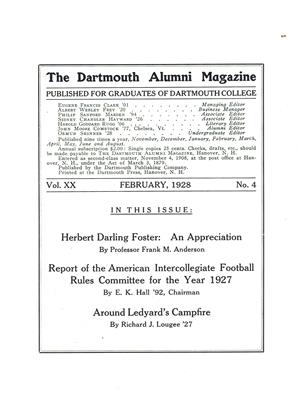The City Manager. By Leonard D. White '14. University of Chicago Press, 1927.
For the last twenty-five years American municipalities have been struggling with more or less success to adapt their machinery of government to the tasks at hand. Inasmuch as these tasks are largely administrative in character the city manager plan has achieved a considerable measure of success and has been hailed as a panacea for all the ills of local government. Every reform, political, social or educational is likely to have its corps of publicity agents and bally-hoo men, the essential dishonesty and worthlessness of whose claims are not in the least altered by the fact that in many instances they really believe them themselves. Some of the literature of the city manager movement has been of this character and students of the subject will therefore welcome a careful, thoroughly objective study like the present.
Professor White is interested primarily in the administrative aspect of the manager plan and his researches in the general field of public administration have rendered him especially competent to write a study of this kind. Eight chapters deal with the concrete experiences of city managers in numerous cities and towns and under a wide variety of conditions. While the reader may sometimes feel that this part of the book might have been curtailed to advantage, it contains, nevertheless, a great deal of valuable municipal history and in the remaining chapters important conclusions are drawn therefrom. The importance of the personal element is very properly emphasized, and it is pointed out that the difficulty of finding men with the necessary personality, educational background, and technical equipment for the managership, is bound to play an important part in the ultimate success or failure of the plan. Furthermore, there is no tendency in this study to overemphasize the value of laws, charter provisions, or administrative theories, as against the actual political conditions existing in the American city. The manager plan is undoubtedly an improved instrumentality but the use made of it will depend largely on the quality of the citizenship of the electorate. While the style and methods of presentation in the volume are of uneven merit and on the whole less deserving of praise than its subject matter, it is one of the most valuable of recent contributions to the literature of municipal government. In its more specialized field it will be indispensable to students of the subject and can be cordially recommended to all citizens who desire an impartial, accurate study of municipal problems and one of the more successful methods of meeting them.
 View Full Issue
View Full Issue
More From This Issue
-
 Sports
SportsREPORT OF THE AMERICAN INTERCOLLEGIATE FOOTBALL RULES COMMITTEE FOR THE YEAR 1927
February 1928 By E. K. Hall '92 -
 Lettter from the Editor
Lettter from the EditorEditorial Comment
February 1928 -
 Article
ArticleHERBERT DARLING FOSTER An Appreciation
February 1928 By Frank M. Anderson -
 Class Notes
Class NotesClass of 1918
February 1928 By Frederick W. Cassebeer -
 Class Notes
Class NotesClass of 1921
February 1928 By Herrick Brown -
 Article
ArticleCOLLEGE NEWS
February 1928
Books
-
 Books
BooksBREAD AND BUTTER BASKETBALL.
December 1960 By CLIFF JORDAN '45 -
 Books
BooksCATHEDRAL PRANCE
JANUARY 1932 By Francosi Denoeu -
 Books
BooksCREDIT UNION NORTH AMERICA
July 1941 By James F. Cusick -
 Books
BooksALL THE BEST IN BRITAIN, INCLUDING ENGLAND, WALES, SCOTLAND AND NORTHERN IRELAND, WITH ILLUSTRATIONS AND MAPS.
OCTOBER 1969 By JOHN HURD '21 -
 Books
BooksSHOW ME THE WAY TO GO HOME.
January 1960 By JOHN R. SCOTFORD JR. '38 -
 Books
BooksADVENTURES IN WORLD LITERATURE.
June 1937 By Stearns Morse

